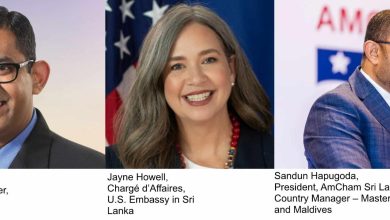CA SRI LANKA
28 leading brands partner with CA Sri Lanka to drive the 46th National Conference of Chartered Accountants
16 September 2025: A total of 28 leading brands, including Sri Lanka’s top corporates, have joined forces with the Institute of Chartered Accountants of Sri Lanka (CA Sri Lanka) to power the 46th National Conference of Chartered Accountants, the country’s largest annual business summit. Together, they champion innovation and professional excellence, united by a shared vision to advance the accounting profession while contributing to Sri Lanka’s economic growth.
Taking place from 8th to 10th October 2025 at the Monarch Imperial, Sri Jayewardenepura Kotte, the conference which commands a history of over 45 years, will continue to serve as a vibrant platform for dialogue, innovation, and policy influence. Drawing over 2,500 participants annually, including business leaders, policymakers, and C-suite executives, the National Conference will act as a catalyst for national and regional transformation.
The Platinum Sponsors are Hayleys PLC, John Keells Holdings PLC, Sampath Bank PLC, Sri Lanka Insurance Corporation Limited, and Toyota Lanka (Private) Limited.
Gold Sponsors are AIA Insurance Lanka Limited, Citizens Development Business Finance PLC, Ceylinco Life Insurance Ltd., Colombo International Container Terminals (Ltd), DAMRO, InsureMe Insurance Brokers (Pvt) Ltd, Noritake Lanka Porcelain Private Limited, Softlogic Life Insurance PLC, South Asia Gateway Terminals (Pvt) Ltd, Sunshine Holdings PLC, Unilever PLC, and Union Assurance PLC, while Nawaloka Hospitals PLC joined as Healthcare Partner.
Silver Sponsors include Ceyline Holdings (Pvt) Ltd., C. W. Mackie PLC, LB Finance PLC, and People’s Leasing & Finance PLC, while the Bronze Sponsors are Lanka IOC PLC, Expolanka Holdings PLC and Seylan Bank PLC. The event is further strengthened by its Print Media Partners, Daily FT, Daily Mirror, and Sunday Times.
Under this year’s theme, “UPRISE – Global Insight >> Local Impact,” the conference will explore how Sri Lanka can strategically position itself in an increasingly interconnected world. As nations navigate shifting geopolitical landscapes, trade realignments, and rapid technological advancements, the event will showcase global insights, inspire forward-thinking policies, and foster collaboration to drive national growth. Key topics will include GDP, FDI, per capita income, health, education, digitalisation, ease of doing business, and professional branding for Chartered Accountants. The conference will open with a ceremonial inauguration on 8th October, followed by technical sessions on 9th and 10th October 2025, featuring eminent local and international speakers, panel discussions, and networking sessions.






